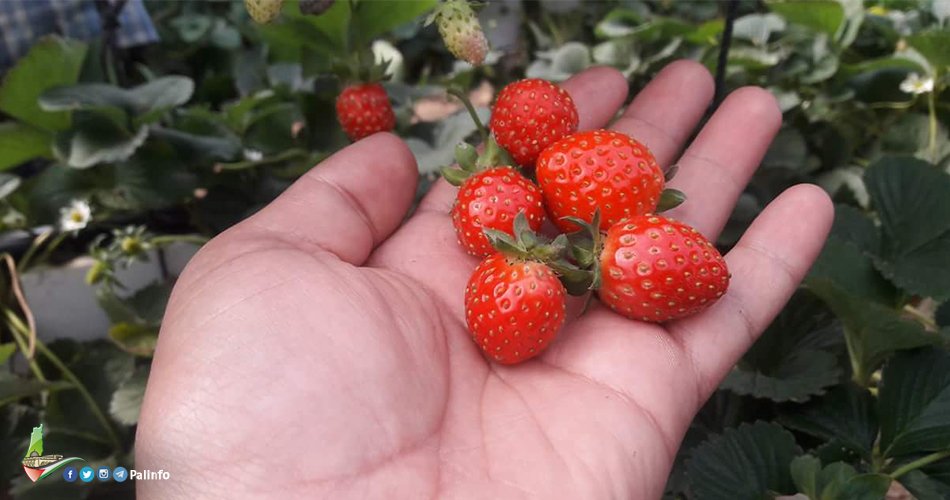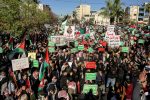As the sun was setting over the farmlands of Beit Lahia in Northern Gaza the Palestinian farmer Akram Abu Khousa 43 and other workers were getting prepared to pick the first batch of strawberries for the new season.
“We hope the new season will be bounteous and help us offset the losses we have suffered in recent years” Abu Khousa said.
He raised his voice asking the workers to spread in the farm and with a hand gesture he showed them the size of the fruits they should pick.
He asked them to pay attention as they move between the strawberry seedlings since they are still in the growing stage.
Modern techniques
Abu Khousa said “This year is going to be different in terms of the quantity and quality of production especially that the last year was marked by abundant crops and farmers continued to export fruits until the end of March which was unprecedented.”
He added that this year he planted over 8 dunums of land with strawberries (1 dunum = 1000 square meters) seven of which by using traditional methods. He explained that this season he managed to use a modern technique in the remaining area which is “hanging strawberries”.
In the “hanging strawberries” techniques strawberries are grown in hanging pots not in the ground as done in the traditional agriculture.
“The hanging strawberries technique has increased the production” Abu Khousa pointed out “One dunum cultivated in the modern way gives more than three times the amount the traditional agriculture techniques provide.”
According to Abu Khousa the soil and climate of Beit Lahia have characteristics that distinguish it from the rest of the Palestinian areas and make it the best to grow strawberries. Beit Lahia’s strawberries have the highest quality and most delicious taste he affirmed.
Local market
With the beginning of December Abu Khousa began harvesting strawberries and exporting them to the occupied West Bank. First Gaza’s Ministry of Agriculture asked the farmers for samples for examination and after testing their quality the average number of trucks allowed to carry strawberries to the West Bank every day through border crossings was decided.
As for the prices the Palestinian farmer said that at the beginning of the season one kilo of strawberries is sold for 10 NIS ($1= 3.5 NIS) and the price gradually decreases to reach 4 NIS.
He noted that the local sale does not cover the basic cost of production adding: “If the export process does not continue abroad we will suffer a major setback.”
Abu Khousa said that Gaza farmers are capable of producing world-class strawberries with a quality that many developed countries are unable to reach.
“This is due to the long experience of the Palestinian farmers in Gaza over the years” he added.
The strawberry season provides job opportunities for many Palestinian youths in Gaza as one dunum needs at least four workers during the harvest. This significantly contributes to reducing the unemployment rates in the besieged Gaza Strip which based on recent reports have reached 67% among young people.
Expected production
Spokesman for Gaza’s Ministry of Agriculture Adham al-Basyuni said that Israel over the past 12 years has attempted to control the export movement of Gaza’s strawberry crops because it is aware of the high sales they achieve in Europe and the occupied West Bank.
The strawberry picking season begins in early December and continues until the end of March 2020 al-Basyuni added.
According to al-Basyuni the cultivated area in the Gaza Strip this year amounts to about 1700 dunums and the production is expected to exceed 5000 tons. Half of the share will go for export outside Gaza and the remainder will be sent to the local market.
These figures are higher than those recorded last year he said and this is due to the regular export movement.
He pointed out that the strawberry production began in the Gaza Strip in the middle of the last century and it is one of the important tributaries of local income.













